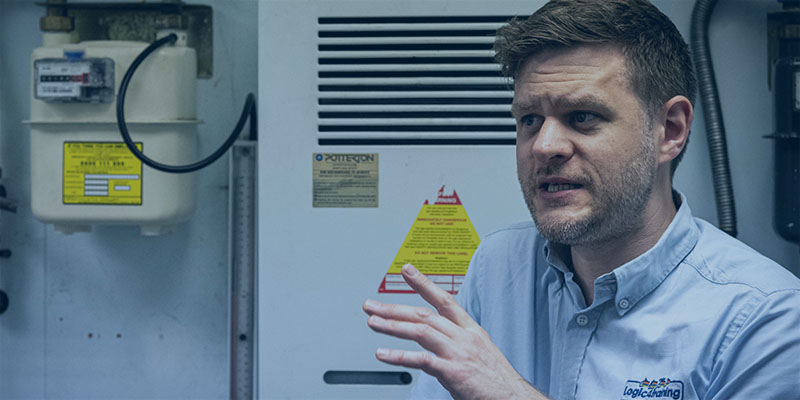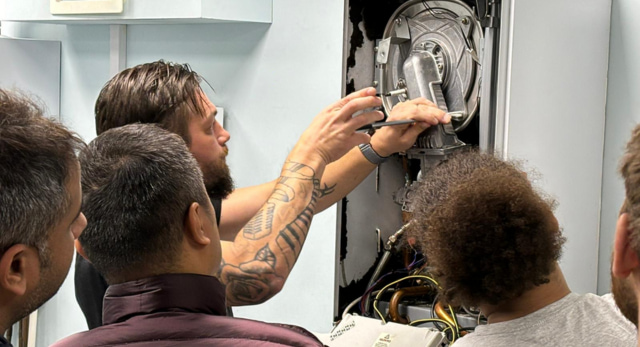Why are condensing boilers classed as high efficiency?
Back again for the second blog in our series on boiler and heating efficiency.
In this blog we are going to talk about condensing boilers, and why they are classed as high efficiency.
To start with, let’s consider what happens during the combustion process.
This is where the boiler ignites/burns the natural gas so that heat can be produced.
To allow the Methane (natural gas) to give off the energy that is stored within it, and for it to do so safely. We need to mix it with oxygen (approx. 21% of air), so that by the time it gets to the burner the methane and the oxygen are pre-mixed.
When this mix is ignited at the burner then heat is emitted, and products of combustion are produced.
Here comes the science bit.
During the combustion process the atoms that make up methane and oxygen are rearranged.
By the time complete combustion has taken place we have heat, carbon dioxide and water.
But have you ever seen water pouring out of a burner?
Hopefully not!
This is because the flame temperature at the burner is nearly 2000°C, and water cannot stay in its liquid state at that temperature. It evaporates into water vapour.
Just as you use energy when you turn on your stove to heat up water when cooking pasta or rice. Therefore energy is used during the combustion process to evaporate water into vapour.
Can this evaporation process be stopped?
Unfortunately, no.
The burner will always produce higher temperatures than the boiling point of water, so water will always evaporate, and heat will be used to make this happen.
It has been calculated that this process uses 11% of the heat produced from complete combustion.
So, for a 20 kW boiler, 2.2 kW of heat is used to evaporate the water. This heat is locked away in the water vapour molecules, and is lost out the flue with the other POCs (products of combustion).
So, this 11% is lost heat, otherwise known as latent heat.
This is not good for bill payers, or the environment.
The good news is that manufactures design their boilers to help recycle some, if not most of the latent heat; and this type of boiler is called a condensing boiler.
If the flue gases can be made to condense, then the latent heat can be reused.
So, how do condensing boilers recycle the latent heat?
Consider how the 11% latent heat was lost, it was through the combustion process when water was evaporated into water vapour.
If the cycle can be reversed, then the latent heat can be recovered.
Latent heat recovery
The reverse of evaporation is condensation, and methane POCs start to condense at 55°C.
So, we want the flue gases to be brought to a temperature lower than 55°C so that the condensing process can be maximized, and we want this to happen at the heat exchanger.
As the heat and flue gases pass through the heat exchanger the heat is transferred through the walls of the heat exchanger to the water. As this heat transfer takes place the temperature of the flue gases drops, and the temperature of the water rises. But the temperature of the flue gases will not drop below whatever the temperature of the water is in the heat exchanger.
So, if the water in the heat exchanger is 65°C then the minimum temperature of the flue gases would be 65°C, if the water was 40°C then the flue gases could go down to 40°C and so on.
Consider this for a minute.
If a manufacture states that their boiler has an efficiency of 92%, is this achievable?
The answer is YES, but only if the flue gases are condensing constantly.
If the flue gases are not condensing, due to water in the heat exchanger being above 55°C, then the actual efficiency of the boiler will drop below, and probably well below, 92%.
So, somehow the temperature of the water in the heat exchanger needs to be controlled. This can be done by designing the system well, and installing, balancing and commission it to ensure that the water coming back to the boiler is less than 55°C.
The key to all this is the temperature of the return.
This is not down to the manufacturer, but the installer.
Next blog……. System design, and how it affects boiler efficiency.
Learn about our low temperature heating course.









